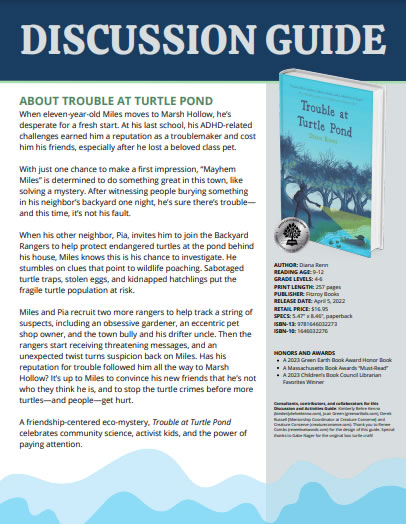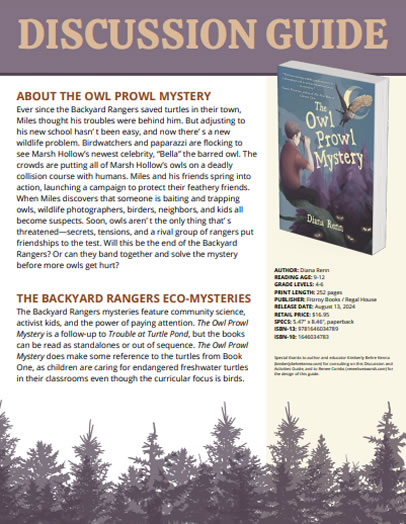Diana Renn
Mysteries that Matter
For Educators
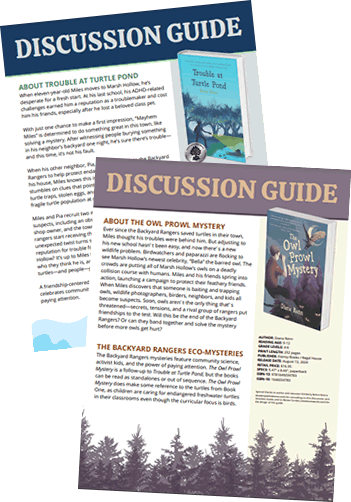
- Classroom activities
- Discussion questions
- Community Science projects
- Curriculum correlations
- Additional resources
I have taught writing, literature, and English as a Second Language in a variety of settings, and worked in educational publishing for many years. I love connecting with readers and writers of all ages, from elementary school to adults. I especially love leading writing workshops!
I am located in Concord, Massachusetts. I typically do in-person events and school visits in Boston and the MetroWest region. I am open to traveling, but I do charge a travel stipend if drives exceeding one hour, flights, or overnight accommodations are required. I also do virtual visits anywhere! Click here to fill out my author visit interest form, and I will get back to you!
Now booking school visits for Fall 2024!
Special offer for schools partnering with Zoo New England’s HATCH program – free virtual visits up to 30 minutes, and 20% discount on in-person visits!
I also invite you to check out my resources on TeachingBooks.net with students, including an audio account of the backstory for Trouble at Turtle Pond.
School Visit / Author Event Fees:
Writing Workshop, Online or In Person: Please email to inquire. Popular workshop topics are listed below, and can be customized for group size, time frame, age range, and setting.
30-minute Virtual Visit: $75. 10-15 minute slideshow presentation and short reading (if desired), followed by Q&A session. FREE for World Read Aloud Day.
45-60-minute Virtual Visit: $150. 20-30 minute presentation followed by Q&A; can include an interactive component such as a writing activity.
In-person Visit: Half-Day: $500, up to two sessions. Discount available if you are purchasing classroom sets or partnering with a bookseller to provide books.
In-person Visit: Full-Day: $800, three to four sessions. Discount available if you are purchasing classroom sets or partnering with a bookseller to provide books.
Panel Moderation: Fee starts at $250, depending on location, time frame, and the nature of the event. I am an experienced panel moderator and especially love leading discussions about mystery writing, eco-fiction, and writing for young readers. I have led numerous panel discussions at conferences, bookstores, author festivals, classrooms, and libraries. I’m great at working with authors to bring out the most fascinating aspects of their book or their research and generating lively discussions. I’m happy to host or interview authors at book launches and other events, and to moderate audience Q&A sessions. Please email me to describe your event and what you are looking for.
Please reach out to me if you are interested in an author visit but feel that the prices may be a barrier for your school or program. I feel strongly about providing all students access to authors. I do offer a limited number of visits to low-income schools at reduced fees.
Click here to fill out my Author Event Interest Form!

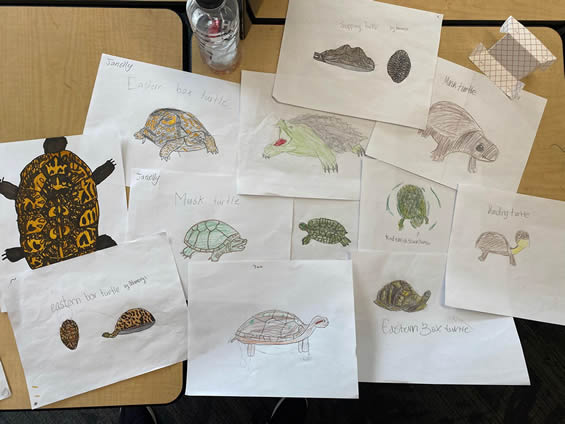
Here are some of my most popular topics for author talks and writing workshops:
Hatching a Book: How My Volunteer Work withTurtle Hatchlings Grew Into a Novel. This talk is well-suited for grades 4-8, and can help to bridge science and ELA. I tell the story of how my son took care of hatchlings in his classroom through Zoo New England’s HATCH (Hatching and Turtle Conservation Through Headstarting) Program, and how I got involved as a parent and a classroom volunteer. My son and I went on to do more turtle work together as community scientists, accompanying local biologists to track nesting female turtles, helping turtles cross our busy roads, and fostering ten hatchlings in our guest bedroom for a month. I share facts about endangered Blanding’s turtles and how a network of biologists, kids, teachers, and parents are working to protect them in Concord, MA. I then talk about how I turned my real-life experience as a turtle helper into a story, sharing photos from my community science work and research to show real-life events that shaped the story. Finally, I encourage kids to explore what THEY are curious about in nature, and explain how telling a story or creating art about wildlife can make a bigger impact. This talk uses a lot of photos and typically takes around 30 minutes, but can be modified to suit any timeframe.
“Hatching a Book” is a great fit for science classes looking for connections to ELA. I can amplify the science behind the story as needed, and focus on what it’s like to be a community scientist using research and field work to shape a story. Although the characters in the story are rising fifth graders, I have given this presentation to middle schoolers and ecology book clubs with teens.
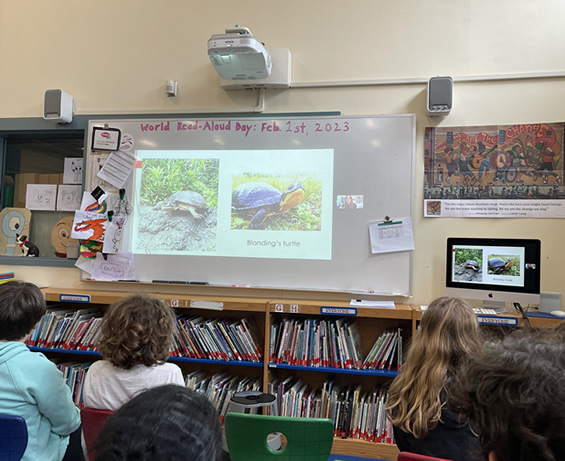
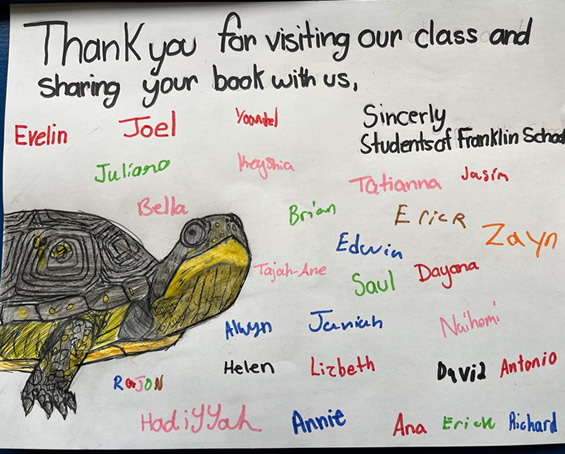
Story Seeds: Writing Inspired By Nature (Writing Workshop). This generative writing workshop is great for schools, camps, wildlife centers offering family programs, and environmental education centers. I have taught variations on this workshop for young children, teens, and adults. Flexibly structured, and easy to modify for different age groups and settings, it can incorporate field work outdoors, take place entirely inside, or even take place over Zoom! I can present this as a one-hour workshop or even an ongoing daily class. It can include reading materials, most of which are available online and at no cost to students, or it can be entirely focused on writing. Please inquire if interested; I am happy to customize this workshop for different settings, ages, group sizes, time frames, and price points.
Birds and Words (Writing Workshop). This generative writing workshop is similar to “Story Seeds” (above) in its flexible structure, but has a special focus on the challenges and possibilities of writing about birds. There are a lot of workshops out there focused on bird art and nature journaling. We will work with images and videos of birds (and even real-life birds) to inspire us, but the focus is on using language to describe how birds appear, sound, move, and behave. This workshop is appropriate for fiction and nonfiction writers alike, and includes examples for analysis (examples will be appropriate for the age group of the students). This is a great workshop to get students thinking about descriptive writing techniques, sequencing events in a narration, writing about process, and writing for different purposes and audiences.
Becoming a Nature Sleuth: How I Write Eco-Fiction. This presentation describes how I plan, research, and write my “Backyard Rangers” eco-mysteries through a conservation lens. From finding seeds of inspiration in nature, to taking myself on field trips, to volunteering with conservation groups, to collaborating with researchers and scientists, writing eco-fiction has made me a creative conservationist. This presentation can incorporate writing exercises to get young writers inspired to write their own stories with conservation themes or about environmental concerns. The entire writing process from planning to revising / editing is covered along the way. This talk uses LOTS of photos, including many of wildlife I have encountered in my community. This talk is also a great fit for science classes looking for ELA connections.
A Book’s Voyage: From Idea to Publication. How does a book become a book? Using examples from my own journey to publication, I explain how an idea can get developed, drafted, revised, sold to a publisher, and eventually find its way into the hands of readers. I also discuss the process of revising and editing with a professional editor, marketing books, writing for oneself versus writing with audience awareness, and what an author’s life is really like.
Write What you DON’T Know: Researching a Book. My novels are meticulously researched and cover a wide range of topics. In addition to writing about different cultures, I have delved into such diverse topics as the Japanese yakuza, the life and work of Vincent van Gogh, bike mechanics, bicycle racing in South America, archaeology, goldsmithing, Turkish shadow puppetry, endangered freshwater turtles, birdwatching, and wildlife photography! Using examples from my work, I discuss the types of sources I turn to, how I evaluate these sources, how I organize my research, and how I juggle researching with writing.
Demystifying Mysteries. This discussion covers the craft of mystery writing, hitting the basic elements: sleuths, crimes, alibis, red herrings, and, of course, carefully planted clues. I discuss problems and challenges mystery writers (especially those writing for younger readers) can sometimes run into, and how we attempt to overcome them. This topic can also run as a writing workshop, and I’m happy to tailor the workshop to the needs and age of the class if you are doing a unit on mysteries.
Writing about Places. My novels take us to locations around the world, as well as closer to my home in Massachusetts. I discuss how I have turned my travel experiences into fiction – including “travels” in my own neighborhood. I also share some of my favorite tools for descriptive writing that create a strong sense of place. This topic can also be a writing workshop tailored to the needs and age of your class.
Popular Topics for Writer-Focused Craft Talks and Workshops – best for teens or adults:
The People-Pleaser’s Guide to Plot. Can’t we all just get along? Many of us go out of our way to minimize or avoid conflict in our lives, but this can be lethal when plotting a work of fiction. If you feel your story grinding to a halt, reenergize it by putting your characters in uncomfortable conversations that they’d rather avoid. In this session, we’ll analyze scenes of characters in confrontations ranging from awkward to angry to understand how to adjust the dials on conflict and emotion. We’ll also identify common conflict-avoidant strategies in fiction. Writers will come away with fresh ideas for a story, or solutions to problems in a current work-in-progress. If your characters are frequently making hasty retreats, resisting the urge, biting back words, restraining their impulses, and belatedly thinking of snappy comebacks or what they really wanted to say, this workshop is for you!
The Writer as Sleuth: Mystery Novel Problems and How to Solve Them. Has something gone wrong with your mystery, but you’re not sure where? Whether you are writing a traditional genre mystery or developing a mystery sub-plot, it’s easy to find yourself stuck in a plot hole, overwhelmed by decisions, or stalling out on your story. Revision can also feel overwhelming, as seemingly small adjustments can have big consequences across an intricate mystery plot. In this workshop, we will discuss the most common challenges mystery writers face, raising our awareness of where and how mysteries can go off track. Challenges to be analyzed include The Case of the Overcomplicated Plot, The Mystery of the Missing Clues, The Convenient Coincidence, The Murky Motive, The Trouble with Technology, The Sleuth Who Had No Stakes, and the Scooby Doo Reveal. We will then discuss how to turn these challenges into opportunities, creating more dynamic characters and plot twists that keep readers guessing. A series of guided writing exercises designed to aid decision making will help you to diagnose problems in your work-in-progress or prevent them if you are just starting out. This workshop will be helpful for writers of both adult and children’s fiction.
Crafting the Child Detective. Mysteries for middle grade and young adult readers present unique challenges and opportunities for the mystery writer. Child detectives may have curfews, cash flow problems, lack of legal knowledge or police contacts, disbelieving adults and overbearing parents. But they can also be surprisingly resourceful or have opportunities and assets that adults and professional sleuths don’t have. In this workshop, you will get to know your young gumshoe better or create one from the ground up. We will study examples from classic and contemporary children’s mysteries, develop a sleuth profile, consider the roles and types of sidekicks, discuss age-appropriate set innovative investigational methods, and even seek out the perfect crimes for our kid sleuths to solve. Finally, we will discuss hidden dangers in writing mysteries for kids (such as implausibility, unintentional parody, the Scooby-Doo reveal) and how to avoid them.
PRAISE FROM TEACHERS, LIBRARIANS, AND PTO
“Thanks to the Massachusetts Center for the Book, we were happy to host Diana Renn for an author talk at our library as part of the Mass Kids Lit Fest. Diana provided an engaging presentation that explained how real-life citizen science for her and her child inspired her eco-mystery chapter-book series about the Backyard Rangers. Besides that, Diana was prepared with props that accompanied her book, handouts like story-writing prompts, take-aways including stickers and participants’ own Pay Attention Log, and even an easy craft that children were excited to create. Diana smoothly handled a crowd of diverse ages, keeping everyone interested, and inspiring children to pay attention, to take care of other creatures, and to write their own stories.” — Matt Atwood, Programming Librarian, Dickinson Memorial Library, Northfield, MA
“Wow! You were an inspiration to over 250 students today during our World Read Aloud Day event. Thank you for sharing your story Trouble at Turtle Pond and teaching us about the Blanding’s Turtle!” — Ms. Talbot, Supervisor of Instructional Technology, Library Media, and Data Reporting; North Merrick School District, New Jersey
“The workshop style worked really well with the fifth graders; you were very engaging and made the writing activities fun and interesting for them!” — Ms. Lane, PTO coordinator of West Elementary Readers and Writers Conference, Andover, MA
“My students absolutely loved your presentation! A mark of a great lesson is when students leave the class and continue discussing what they learned in the hallways and beyond. There was much talk about Blanding’s Turtles in the hallways as I made my way back to my classroom to teach my next class. Thank you so much for being such a professional and for being such an inspiration to all who come in contact with you. What a phenomenal presenter you are!” — Mr. Morelli, middle school English teacher, Westchester Country Day School, High Point, NC
“Sending you a huge THANK YOU for such an engaging zoom meeting this morning. My fifth graders were really interested in your presentation and they all want to read your book now! I am so glad we found a fellow turtle lover and also got to learn about the writing process.” — Ms. Smith, fifth-grade teacher, Cottage Street School, Sharon, MA
“Thank you for taking the time to virtually visit our class. The students thoroughly enjoyed your presentation and reading.” — Ms. Folling, eighth-grade science teacher, Franklin School, Newark, NJ
DISCUSSION AND ACTIVITIES GUIDES (FREE DOWNLOADS!)
My middle grade novel, TROUBLE AT TURTLE POND, has an accompanying Discussion and Activities Guide, which was developed under the guidance of Creature Conserve’s Arts + Sciences Mentorship Program (www.creatureconserve.com) and with input from classroom teachers and arts educators. A PDF of this guide can be downloaded for free. A guide for the forthcoming sequel, THE OWL PROWL MYSTERY (coming 8.13.24), is already available! Scroll back to the top of this page for the download button.
My three YA novels are TOKYO HEIST, LATITUDE ZERO, and BLUE VOYAGE. TOKYO HEIST was an Indie Next Pick and LATITUDE ZERO was a Junior Library Guild Selection. BLUE VOYAGE was selected as a Massachusetts Book Awards Must-Read. TOKYO HEIST is available in a paperback reprint edition from Speak / Penguin Random House. LATITUDE ZERO and BLUE VOYAGE are hardcover only and unfortunately now out of print, but are still available in libraries and for purchase as e-books.
The three YA novels are stand-alone mysteries set in other countries (Japan, Ecuador, and Turkey) and feature strong female sleuths. They are marketed for grade 7 and up, but are appropriate for slightly younger readers too. Free Readers Guides with discussion questions and extra activities are available for each of my books and can be downloaded here:
Diana Renn Author | Website Content Copyright © 2024 | Privacy Policy
